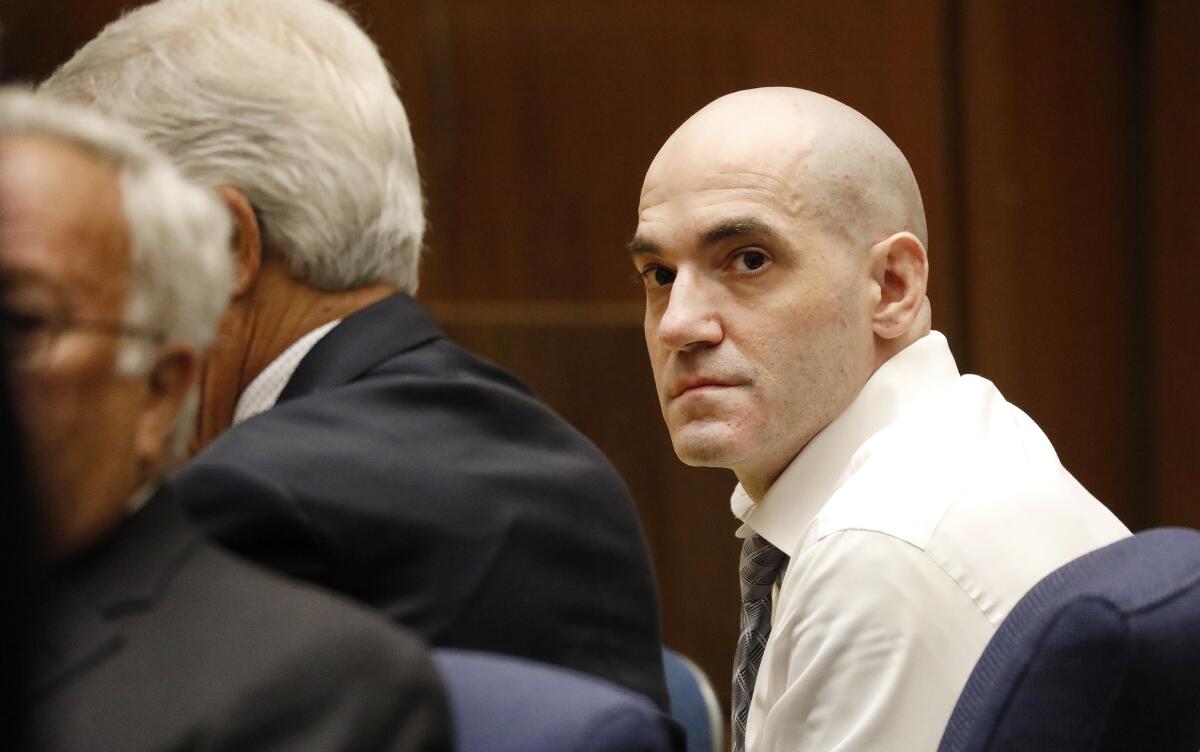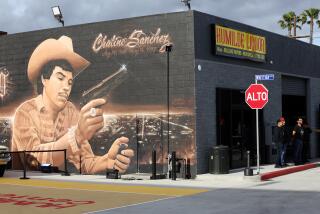‘Boy Next Door Killer’ Michael Gargiulo should get the death penalty, jury decides

A jury decided Friday that Michael Gargiulo, a serial killer who terrorized women who lived near him in the Los Angeles area, should be put to death, a verdict bookending a wrenching trial that began with the harrowing account of a survivor and ended with a son’s plea to spare his father’s life.
The jury deliberated for several hours over three days in the penalty phase of the marathon trial that featured testimony from actor Ashton Kutcher and grisly accounts of the slayings and assaults committed by a man dubbed the “Hollywood Ripper” and the “Boy Next Door Killer,” a sobriquet that stemmed from his habit of stalking and killing women who lived nearby.
Gargiulo showed no expression when a clerk read the verdict. His attorney, Daniel Nardoni, squeezed his shoulder.
Prosecutors depicted Gargiulo, 43, as a savvy predator capable of discerning the rules of society and making it appear he was living within them even as he was breaking into homes at night to threaten, brutalize and murder women.
Gargiulo was “well groomed, fit, attractive,” Deputy Dist. Atty. Garrett Dameron said this week during closing statements. “A businessman. Employed. Friends. Family. A child. A normal life by day — and at night, a completely different individual.”
But his attorneys argued that Gargiulo was a battered, neglected child who grew into an antisocial man beset with severe mental illness.
Though mental illness doesn’t excuse Gargiulo’s crimes, Nardoni told jurors this week, it should be taken into account when deciding whether he should be executed.
“Am I angry?” Nardoni said outside the courtroom after the verdict was read. “You’re right, I’m angry. It’s not right to kill our mentally ill. It’s a matter of humanity.”
Members of the jury — six women and six men, along with three alternates — declined to comment on their way out of the courthouse. Superior Court Judge Larry P. Fidler set a formal sentencing date for Feb. 28.
In August, the same jury found that Gargiulo was legally sane when he murdered Ashley Ellerin in 2001 and Maria Bruno in 2005, as well as when he tried to murder Michelle Murphy in 2008.
Gargiulo met Ellerin, a 22-year-old fashion student, after helping her change a flat tire. An air-conditioner repairman, Gargiulo offered to fix Ellerin’s heater and began showing up uninvited at her home.
Her body was found in her apartment with 47 stab wounds in February 2001, her throat slashed so deeply she was nearly decapitated. Kutcher had been set to go out on a date with Ellerin that night and testified to how she didn’t answer her door or his calls.
Bruno, 32, was killed in her El Monte apartment in December 2005. Gargiulo, who lived in the same complex, stabbed Bruno, cut off her breasts and tried to remove her breast implants, prosecutors said.
Her estranged husband, Irving Bruno, told the jury last week he didn’t immediately tell his four children — ages 2 through 5 at the time — that their mother was dead.
But “ultimately,” Bruno said, breaking into tears, “I had to divulge the information that their mother had been killed, that she would no longer be present in their lives.”
As Bruno spoke, Gargiulo stuffed a finger in his ear as if to block out the man’s words.
Gargiulo was also found guilty of attempting to murder Murphy in April 2008. Murphy, who was 26 at the time, testified that after falling asleep for about an hour in her Santa Monica apartment, she woke up to a man straddling her in the dark, wordlessly stabbing her in the arms and chest.
Murphy managed to fight off her attacker, who yelled “I’m sorry!” as he ran out the door, she said.
Prosecutor Dameron said the violence Gargiulo wreaked on women was the “tapestry, if you will, of his life,” describing a string of killings, rapes, threats and assaults that Dameron said Gargiulo committed across a 15-year period.
Gargiulo has also been charged in Illinois with the murder of Tricia Pacaccio, the sister of Gargiulo’s childhood friend, who was found stabbed to death on her parents’ porch the morning of Aug. 14, 1993. She was 18 and about to head off to Purdue University to study engineering.
Nardoni, Gargiulo’s attorney, outright begged the jury not to condemn to death a man he described as the mentally ill product of a family that showed him nothing but abuse, cruelty and, finally, abandonment.
“Sometimes,” Nardoni said, “violence breeds violence.”
Last week, a psychologist who interviewed Gargiulo’s father and most of his six siblings described a train of abuse that began with 2-year-old Michael Gargiulo being hogtied with his father’s neckties and left in a closet for days.
His hands were held over a stove top until they blistered, and his father hit him in the head with a baseball bat and a golf club, the psychologist, Vianne Castellano, said. Knowing Michael’s fondness for animals, his siblings tied the boy to a stump in the backyard and made him watch as they blew up hamsters, gerbils and cats with M-80 firecrackers, Castellano said.
Gargiulo stared ahead, expressionless, as the psychologist described him being ridiculed by his family as “the weak link, the sissy boy, the designated whipping boy of the family.”
Castellano, who interviewed Gargiulo for 300 hours, said he has no memory of the abuse or of his childhood at all. His memory begins when he left home at 18, she testified.
Prosecutors assailed Castellano’s credibility, pointing out her handwritten notes from interviews with Gargiulo’s relatives contain virtually no mention of the abuse she said he suffered.
Pressed by Deputy Dist. Atty. Dan Akemon, Castellano acknowledged that although notes from her interview with Gargiulo’s father, Eugene, don’t mention him clubbing an adolescent Michael with a baseball bat, they do reference Michael throwing his father through a window.
Last week, Gargiulo’s legal team called its last witness.
A boy in a gray hooded sweatshirt took the stand. He was nervous, and he stammered when the clerk swore him in.
“Who’s that gentleman at the end of the table?” one of the lawyers asked.
He locked eyes with Gargiulo. Gargiulo smiled. The boy smiled back, and began to cry.
“That’s my dad.”
Andrew Gargiulo, now 16 and a junior in high school, was 5 years old when his father was arrested in June 2008, two months after the assault on Murphy.
Andrew said he grew up believing his father worked in a foreign country. When Gargiulo wrote him letters from jail, his mother told him the letters had come from overseas, he said. He learned his father was in custody when he was 10 years old.
“I don’t see a psychopath,” he told the jury. “I don’t see a murderer. All I see is my dad, and I would like him to still be alive so I can talk to him.”
Dameron, the prosecutor, said Andrew Gargiulo is yet another victim of his father’s crimes.
“When his son was 2, where was he? He was standing over Maria Bruno, removing her breasts,” Dameron said.
Gargiulo’s son was able to plead for his parent’s life, Dameron said, but “Maria Bruno’s children didn’t get that chance.”
More to Read
Sign up for Essential California
The most important California stories and recommendations in your inbox every morning.
You may occasionally receive promotional content from the Los Angeles Times.










